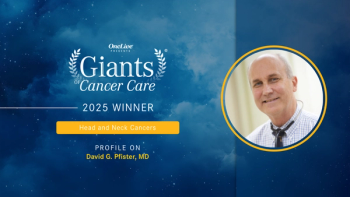
Advice for Managing Patients With Thyroid Cancer
Transcript: Eric J. Sherman, MD: Thyroid cancer is an exciting field. Until a decade ago, or a little more than a decade ago, there was nothing being done in thyroid cancer. Over the [past] 10 years, we’ve had 2 drugs become FDA approved in differentiated follicular cell thyroid cancer. We have multiple drugs that are compendium approved by the NCCN [National Comprehensive Cancer Network] guidelines that should be very active. You could sequence the different drugs together. But more importantly, a lot of clinical studies are trying to use newer combinations, newer drugs, and are trying to hit newer targets.
It’s a really exciting field. Patients will have a lot of options. One of the important things is to make sure that patients get access to those options. That’s one of the reasons why they should be seen by someone in an academic center—to see what’s out there and to see if there’s something available for them. The good thing with thyroid cancer is a lot of patients are in good enough shape to travel. Also, most of these drugs are oral. Patients are willing to travel to get access to one of these drugs that can really help them quite a bit.
Marcia S. Brose, MD, PhD: I think that with all of these emerging therapies, thyroid cancer is really becoming a field of its own. It used to be something that wasn’t even on the board exams for oncology. Now I think a community oncologist will be seeing these patients. If they’re going to treat these patients, it really would benefit them to go to a course that’s given by an academic center, or to form a partnership with some of the centers. We often will see a patient in consultation, and then we will work with a local oncologist for treatment. So they don’t need to come to us all the time, but we would like to partner with the people in the community.
My concern is when a physician in the community who doesn’t have experience managing these patients, doesn’t know when to start to treat, doesn’t know how to manage the dose, and doesn’t know how to manage the side effects, takes on a patient like this. It’s important to make sure that they are educated. There is a lot of help available. For the community oncologist who is doing this for the first time, just reach out for help. There are tons of us who would love to help. Reach out by email. Ask questions. After a while, you do learn. It really is an experience. It’s a very satisfying condition to treat.
I don’t know of many other cancers where you can make such a big difference in a patient’s life—from going from the very short overall survival of 2.5 to 3.5 years with a terrible quality of life. Now you have these agents that work so well, especially to prolong progression-free survival, which is really a period of time when the patient doesn’t have any symptoms.
So it really is a very satisfying area. I’d encourage them to get involved. I’d also encourage them to learn as much as they can about these agents before they actually give them. If they have any questions along the way, ask for help. There is more than enough help out there, and there’s more and more experience available all the time.
Johannes (Jan) Smit, MD, PhD: The most important advice that I would like to give to community physicians regarding the treatment of thyroid cancer is to be attached to colleagues. You should be part of a multidisciplinary team. This could even be a virtual multidisciplinary team. You can work at your own hospital. If there is not much experience or expertise in thyroid cancer, you should create a relationship with a bigger center or another center for which that expertise is present. I really believe it’s necessary to ensure that the quality of care for our patients is optimal.
Transcript Edited for Clarity


































